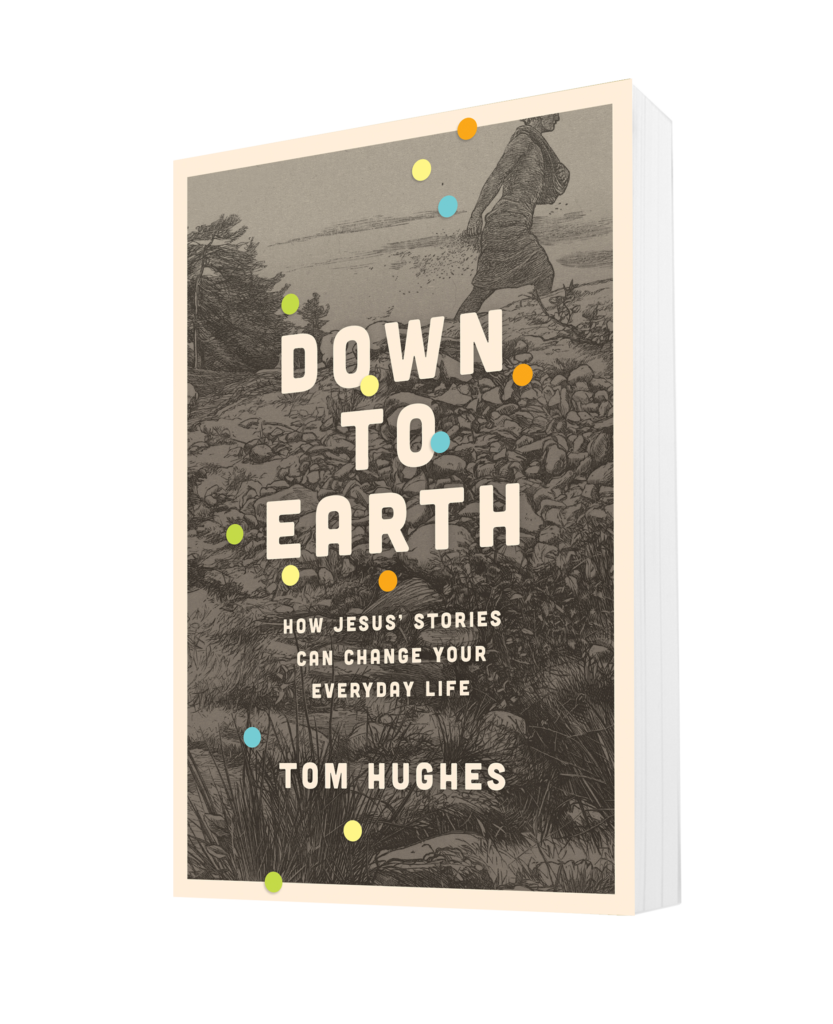It can be a painful thing not to keep your eyes on your own path.
In college, I played rugby, which is a sport that involves a lot of running. To keep our conditioning runs interesting, our team decided to jog through the historic district of the town. As we were running on the sidewalk, something happened on the street. It might have been a hot rod that revved its engine, but to this day I cannot remember exactly what it was. But I do recall what happened next.
As I was running, I took a quick glimpse to the side to see what was happening on the street. When I did that, somehow, magically, a parking meter sprouted up right in front of me! It was one of those moments in life when you know something bad is about to happen but you are powerless to stop it. So with shoppers watching and my merciless teammates alongside, I ran full speed into a parking meter. Apparently, my momentary look to my right took me two steps to my right, which was two steps too many.
My collision with the parking meter knocked all the wind out of me. I dropped to the sidewalk, doubled over and trying to regain my breath, to which one of my teammates dryly shared, “Well, I guess that’s what you get when you don’t keep your eyes on your own path.” Gee, thanks.
Sideways glances do not happen just when we are running; they can happen when we are living our everyday lives. They happen in the form of comparing ourselves, our lives, and our opportunities with others. Instead of knocking the wind out of us, such comparisons knock the gratitude out of us. Comparison is the thief of joy.[i] Jesus once told a story about that very thing and how destructive it is for our eyes to drift from our own paths.
A Story of Comparison and Envy
Jesus tells the story this way in Matthew 20:1-16.
The kingdom of heaven is like a landowner who went out early in the morning to hire workers for his vineyard. He agreed to pay them a denarius for the day and sent them into his vineyard.
About nine in the morning he went out and saw others standing in the marketplace doing nothing. He told them, “You also go and work in my vineyard, and I will pay you whatever is right.” So they went.
He went out again about noon and about three in the afternoon and did the same thing. About five in the afternoon he went out and found still others standing around. He asked them, “Why have you been standing here all day doing nothing?”
“Because no one has hired us,” they answered.
He said to them, “You also go and work in my vineyard.”
When evening came, the owner of the vineyard said to his foreman, “Call the workers and pay their wages, beginning with the last ones hired and going on to the first.”
The workers who were hired about five in the afternoon came and each received a denarius. So when those came who were hired first, they expected to receive more. But each one of them also received a denarius. When they received it, they began to grumble against the landowner. “These who were hired last worked only one hour,” they said “and you have made them equal to us who have borne the burden of the work and the heat of the day.”
But he answered one of them, “I am not being unfair to you, friend. Didn’t you agree to work for a denarius? Take your pay and go. I want to give the one who was hired last the same as I gave you. Don’t I have the right to do what I want with my own money? Or are you envious because I am generous?”
So the last will be first, and the first will be last.
Jesus throws this story alongside our hearts to confront one of life’s most common occurrences. In the parable, the owner starts at 6 a.m. but then returns throughout the day: 9 a.m., noon, 3 p.m. Each time he sends out more workers to the field. The last group is sent out at 5 p.m. It is the eleventh hour of a twelve-hour workday.
At this point in the story, everybody is satisfied, at least partially. With some of them having started the day with no guarantee of anything, they all now will at least receive something. They are all better off than when the story began. These were day laborers who lived off the work they did that day. No work would mean no food that night for them or their families. Everyone at this point is relieved and grateful not to be headed home empty handed to a houseful of hungry children.
Because the first workers are paid last, they have a chance to take a peek at what the other groups of workers are being paid. They are delighted when they see the groups ahead of them graciously being paid a full day’s wage even though those workers did not work a full twelve-hour day. They are delighted not for the generosity given to the other workers but because they now presume they will be paid more. But when they get to the table, they are given one full day’s wage like all the rest before them.
Had those who worked the longest been paid first, they would have left content, satisfied, and happy. They got what they’d agreed to at the beginning of the day: a fair day’s pay for a fair day’s work. The landowner was true his word and just in his payment. But now they are furious. They are furious with what would have satisfied them (and what they originally agreed to at the start of the day). That’s what comparison does: It provokes us to overestimate what we need and underestimate what we already have. One of the great tests of our hearts is to decide to be genuinely happy for others when things are going well for them without wondering why the same is not now happening for us.
Their Best Moments versus Our Mundane Ones
The rise of social media has created more opportunities than ever before to take comparing looks into our friends’ lives. I am not anti-technology, but now it’s no longer just comparison; now it is comparison with the edited, filtered, and packaged pictures that give us only a selected portal into the lives of our friends. We see their best moments and measure them against our mundane ones. It’s the same with what we let them see in our lives through our posts. Author Shauna Niequist nails the challenge of social media when it comes to comparison:
It’s very, very easy to tell partial truths—to show the fabulous meal but not the mess to clean up afterward. To display the smiling couple-shot, but not the fight you had three days ago. To offer up the sparkly milestones but not the spiraling meltdowns.[ii]
Of course, we do not need social media to fall prey to the trap of comparison. Yet in today’s world, those who would be waiting to be paid last would not even have to go looking for the comparison. The workers on the receiving end of the extravagant act of generosity of the landowner would have posted about it on their Instagram story within the hour. With social media, sometimes the envy-creating comparison comes looking for you.
Those who worked the longest made their case for their perceived injustice. Admittedly, from their vantage point, this does seem patently unfair. That’s the thing about grace: It is always unfair. It never seems more unfair and unjust than when you think you are not the recipient of it and others are. The owner responds, “Listen, there has been no injustice here. I paid you exactly what I agreed to pay you at 6 a.m.” Then the owner brings us to the pivotal questions of the whole story: “Am I not free to do with my abundance what I want? Or will you be embittered because I am generous?” When you ignore God’s goodness to you, you tend to resent his goodness to others.
Theologist D. A. Carson rightly sees the danger of constant comparison and complaint to the health of our souls:
Persistent negativism is spiritually perilous. The person who makes it his life’s ambition to discover all the things that are wrong . . . is exposing himself to spiritual destruction. Thankfulness to God both for good things and for his sovereign protection and purpose even in bad things will be the first virtue to go. It will quickly be followed by humility, as the critic, deeply knowledgeable about faults and fallacies (especially those of others!), comes to feel superior to those whom he criticizes. Spiritual one-upsmanship is not a Christian virtue. Sustained negativism is highly caloric nourishment for pride.[iii]
You Will Find What You Are Looking For
This parable affirms the sovereign grace of God while it rejects presuming grace or comparing it. Grace is always amazing grace. Grace that can be calculated and expected is no longer grace. Comparison often leads to envy, which has a boomerang effect on our souls. As novelist Aleksandr Solzhenitsyn saw, “Our envy of others devours us most of all.”[iv] Here is a surefire way to guarantee your unhappiness: spend a lot of time comparing your life to others.
Whether we look for reasons to be grateful or to complain, we will find what are looking for. It’s a bit like the difference between a vulture and a hummingbird. The vulture starts out the day looking for death. Because that is what it has set its heart to look for, sure enough, it will find it. The hummingbird starts out the day looking for the sweet nectar in life. Because that is what it has set its heart to look for, sure enough, it will find it. Even in our brightest hour, there is something bad we can gripe about. Even in our darkest hours, there is something good we can see.
A while back I was at Hume Lake Christian Camp for an all-staff retreat we had planned. It’s a gorgeous camp with a lake nestled among the pine trees immediately adjacent to Kings Canyon National Park in the Sierra Nevada of California. The camp looks like a postcard for serene beauty. I had arrived an hour early to simply verify that everything was prepared for our soon-to-arrive staff.
During the check-in process, one of the people helping me told me how envious he was that I got to live in Los Angeles. He commented on all the amenities, the things to do, the energy and excitement of the city. And yes, much of what he said is absolutely true. Los Angeles has world-class amenities, food, activities, beaches, and more. But I softly chuckled when he said this.
He asked, “Why the laugh?”
I responded, “Oh, I was just thinking about how great you have it to live in the midst of all this quiet and beauty in the mountains, with the lake and the nearby waterfalls. Plus, you never have to sit in traffic here.” We tend to see what we are looking for.
You’ve been reading with Tom Hughes from Down to Earth: How Jesus’ Stories Can Change Your Everyday Life. Read a free excerpt from the beginning of the book here. Or get started on the YouVersion reading plan in English or Spanish.

[i] Theodore Roosevelt, Quote Fancy, https://quotefancy.com/quote/33048/Theodore-Roosevelt-Comparison-is-the-thief-of-joy. (Although this quote is often attributed to Roosevelt, some argue its origin.)
[ii] “Instagram’s Envy Effect,” Relevant, April 4, 2013, https://relevantmagazine.com/article/stop-instagramming-your-perfect-life/.
[iii] D. A. Carson, Exegetical Fallacies (Grand Rapids, MI: Baker, 1996), 22.
[iv] Aleksandr Solzhenitsyn, Goodreads, https://www.goodreads.com/quotes/415498-what-about-the-main-thing-in-life-all-its.

